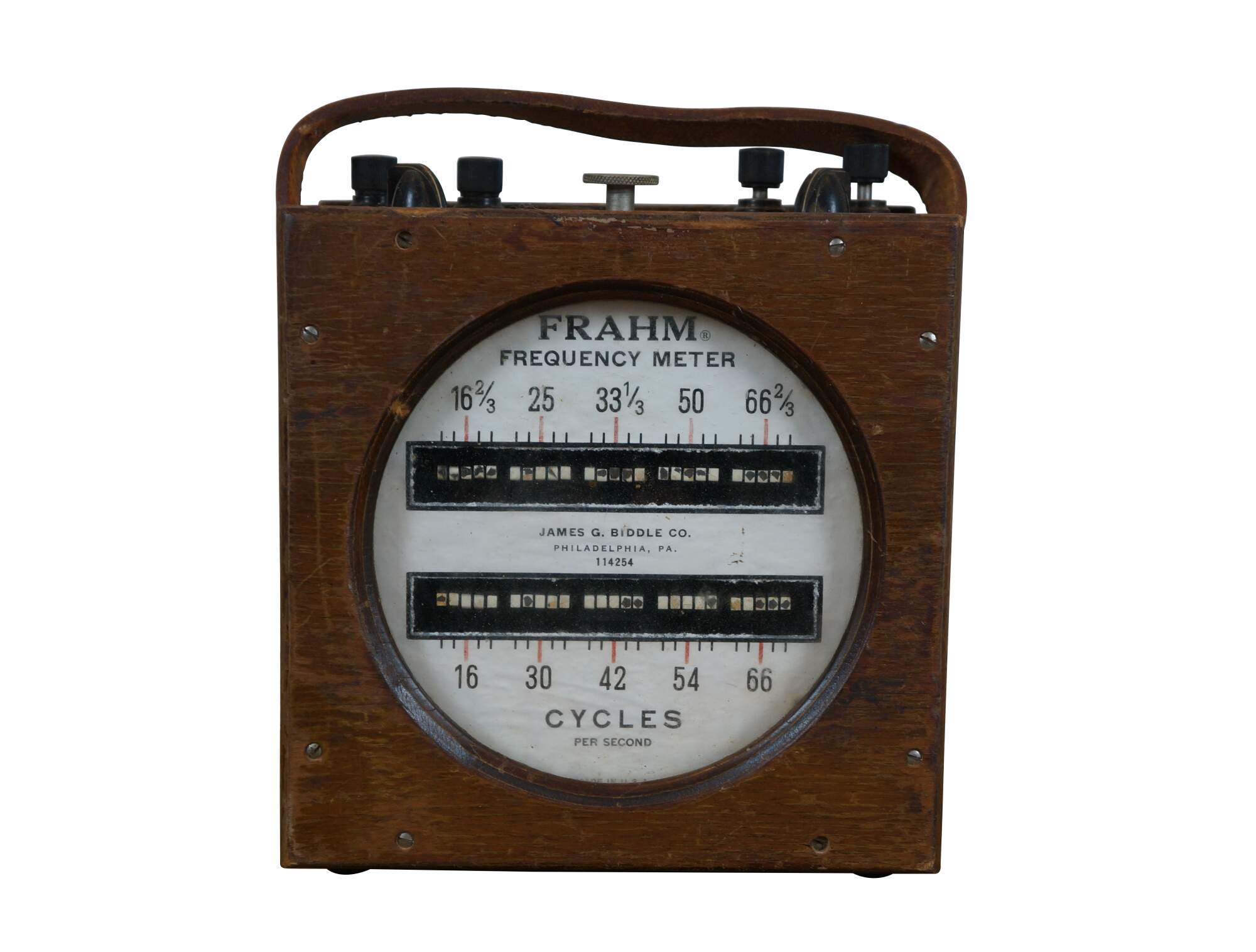
Shipping:
Free Shipping Included
Delivery:
Estimated 2-15 Business Days
Payments:
Credit Card, Check, Cash, PayPal, Apple Pay, Venmo
Returns:
30 Days 100% Money Back Guarantee, Buyer Pays Return Shipping
Description
Circa early to mid 20th century Frahm Frequency Meter - James G. Biddle Company - Philadelphia, PA - 114254. Wood case; glass front; leather handle.
"The vibrating reed frequency meter, also called the Frahm frequency meter after its inventor, Hermann Frahm, comprises a graded set of tuned metal reeds, typically 11 or 21, which are arranged to vibrate in response to an oscillating magnetic field or mechanical vibration. They are rugged analogue instruments useful for measuring the frequency of a mains supply or an engine’s rotational speed." (Source: Pub Med Central / National Library of Medicine)
"It was early 1895 and a young James Biddle – just 27-years-old – was looking for a new hustle. After leaving his job – frustrated by the impersonal approach to sales and waning financial status of his former employer – Biddle concluded that “a business founded on a firm belief in personal relationship, and an intensive desire to perform a special service not elsewhere available, offered promise of success”. And he did just that. In February of that year, Biddle opened his doors and began importing and selling scientific and electrical equipment from his office in Philadelphia. Except, you’d rarely find him behind his desk. Biddle was a networking ace – travelling thousands of miles each year – to make connections with scientists at colleges across the country, as well as utility and industrial workers in the United States. Driven by the simple fact that he could give his customers an instrument “not elsewhere available” and backed by an unmatched level of personal service, which many businesses simply did not extend. As industrialization was rapidly expanding across the country and the economy was hitting an all-time high, Americans began to realize they could design and manufacture their own electrical equipment, rather than importing it. Of course, Biddle jumped on this opportunity – adding instruments manufactured right here in the United States to his sales repertoire. And if Mr. Biddle wasn’t actively seeking out new connections, he was searching for the next greatest test instrument to add to his ever-expanding catalog. With a strong business model, centered on consistent, personalized and unique service, it comes as no surprise that his one-man enterprise would ultimately grow to become the organization it is today. Anyways, it was 1910, and Mr. Biddle was about to get the sales lead of a lifetime from Dr. Rowland – a close friend and Head of the Electrical Department at Drexel University. Rowland introduced Biddle to a new device for measuring insulation resistance in megohms. While the demonstration alone was probably exhilarating for Biddle, it was the next statement that was truly exciting. The British manufacturers were looking for a distributor in the United States. Well, a trip across the pond was clearly in order. After meeting with the manufacturer, Evershed & Vignoles, in London, Mr. Biddle made an agreement that would forever change the course of the company. The Biddle firm was now the sole distributor of Megger® Testing Instruments in the United States. Many years later, demand in the United States reached an all-time high, and the US Navy became the largest single customer for insulation testers. Unfortunately, World War II was in full swing abroad – inhibiting Evershed & Vignole’s ability to manufacture an adequate supply of insulation testers, and the Navy was becoming increasingly more impatient. With the threat of losing their largest customer, the Biddle company was granted permission by Evershed & Vignoles to manufacture “Megger” testers in the United States. This was big, folks. Eventually, Biddle Instruments would become incorporated into the Megger family of brands." (Source: Megger)
Condition
Good Overall - Gentle wear
Dimensions
8.5" x 4.25" x 9.5" (Width x Depth x Height)